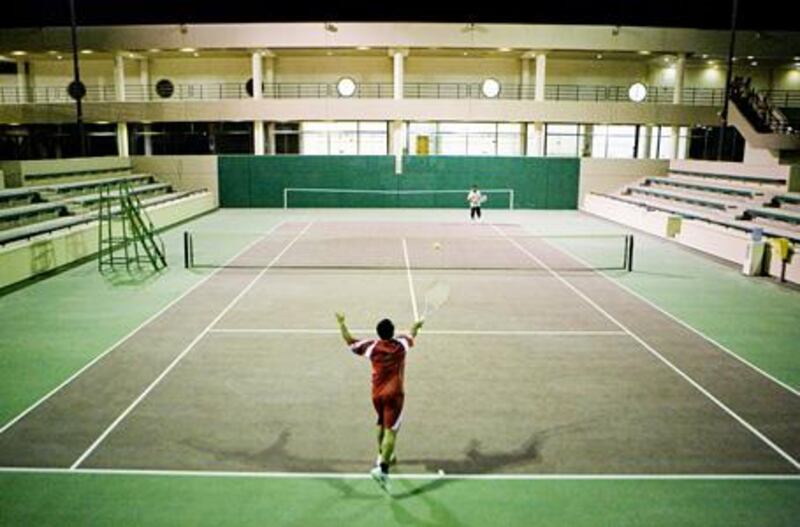The UAE's top tennis official tells Sarah Tregoning about plans to crack down on unqualified coaches and promote professionalism. Tennis Emirates (TE) is to crack down on unqualified coaches who make easy money offering sub-standard tennis lessons to unsuspecting students under a raft of new measures to encourage greater professionalism in the sport. Every institution and coach in the country will soon have to apply for a permit under new powers handed down to Tennis Emirates by the General Authority for Youth and Sports Welfare.
"There are going to be some big changes for tennis in this country," said Eric Gottschalk, managing director of MediaPro, which have the marketing and management rights of UAE Tennis Association. "Registering coaches is normal practice everywhere in the world and it will help to protect the sport in the UAE. "We need to enforce minimum standards and stop people who may not have the proper qualifications from being able to teach tennis. Teachers in schools have to hold certain certificates and we think it should be the same for tennis coaches."
Gottschalk said rogue coaches were becoming a problem in the UAE, but that a planned national database would act as deterrent. Any institution involved in the sport, from hotels offering coaching to individual instructors and established academies must register their coaches. "There are people who come into the country on cleaners' or accountants' visas but offer tennis lessons. Some people have proper qualifications, but there are courses where you can enrol and pay to become a coach in three days. We don't think that makes you a good teacher.
"Different countries have different requirements and we want to bring every coach offering lessons up to a minimum level. Coaches are going to have to register and we will ask for their certificates and also insist they take part in basic coaching courses during which they will be tested." This even applies to long-standing institutions like Clark Francis Tennis, which has been around for 20 years and the Matchpoint Academy run by former India Davis Cup player, Zeeshan Ali.
"It will be enforced for everyone," said Gottschalk, adding that registration will carry with it a nominal fee. "Former players come into coaching at a higher level because of what they have achieved, but we hope that they will see it as an opportunity to refresh their skills. We hope they will want to do it." It is not just coaches who will need to register. When the season starts on October 1, Tennis Emirates will expect players to be members as well.
"We are going to compile a database of players," said Gottschalk, adding that growing the sport among Emiratis was a prime objective. "The International Tennis Federation (ITF) have certain regulations for national associations - to have a membership programme, hold regular competitions, have a ranking circuit and have Davis Cup and Federation Cup teams." From the middle of next month, TE will distribute handbooks to bodies informing them of the changes and will allow a six-month grace period to comply.
Five tennis circuits are to be established including the under 10 ages which will encompass eights, nines and 10s as separate categories, under 12s and under 14s, under 16s and under 18s, men and women and veterans, divided into over 40s and over 50s. Tournaments can include any or all of the five circuits, but from this season all open tournaments must be officially sanctioned by TE. "Closed or internal tournaments are a different matter, but we will have to sanction open tournaments and we will support them as much as possible" said Gottschalk. "We are hoping to be in a position to provide equipment like trophies and balls and help with the draw.
"In return we would expect that all draw sheets and tournament paperwork is done on a computer, rather than hand-written, results of the tournaments are published within one day and that deadlines for entries are enforced ." All tournaments must have two wild card places open to Emiratis. The national ranking circuit, which was established in the 2007-8 season but never continued, will be relaunched.
"Last season was a bit of a disaster," admitted Gottschalk but insisted the stop-start nature of development was a thing of the past. "The work we did was not continued and there were hardly any tournaments. Now we have seen a renewed commitment from TE. "We have identified 87 institutions across the UAE and estimate that there are 400 courts. We are hoping to have 10,000 registered members within two years with 10 to 15 per cent made up by Emiratis."
Gottschalk admitted the UAE, which offer the highest prize money for its ITF-ratified tournaments in the GCC, was in the enviable position of having 13 weeks of international tennis, such as the Dubai Open Championships, per year. But that game at the grass roots level was often forgotten amid the glamour of world-famous players. "TE is now focusing on the development of the game," he said. "These changes are going to make tennis more professional and we hope they will be welcomed."
stregoning@thenational.ae





